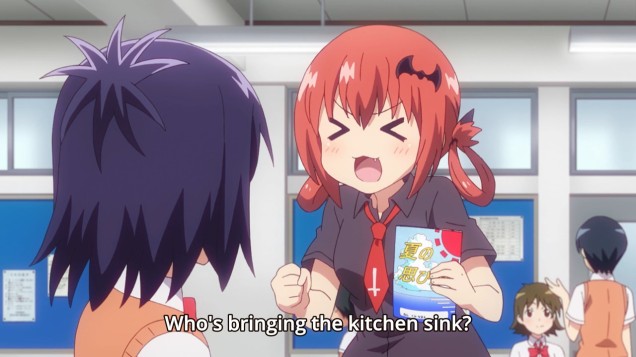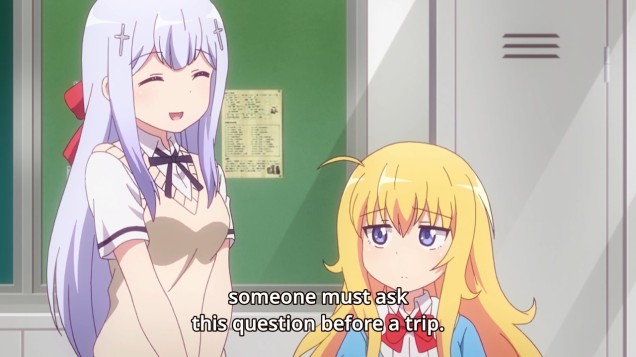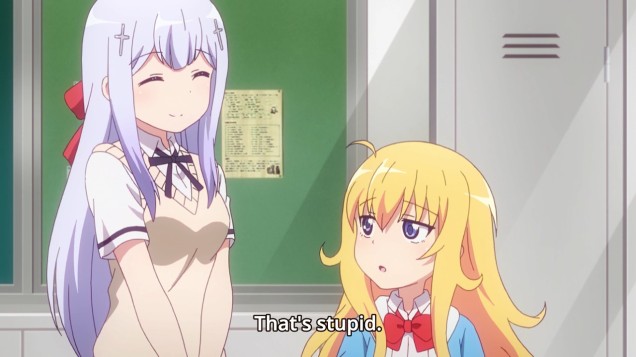
Hey guys! It’s time for another Lost in Translation. This entry comes from episode 4 of Gabriel DropOut where we see Satania throwing out a strange suggestion whilst the girls are discussing plans for their trip to the beach.

Of course, none of this really makes any sense. The idiomatic expression “everything but the kitchen sink” is, indeed, used in contexts pertaining to itineraries and whatnot, but there’s more to this joke when we take a look at Satania’s original Japanese line:
バナナはおやつに含まれますか。
(Banana wa o-yatsu ni fukumaremasu ka)
Lit. Banana (is) snack/sweet (be) included (interr.)
Yup. She says the word “banana”. In fact, this is a variation of the idiomatic expression バナナはおやつに入れますか (banana wa o-yatsu ni iremasu ka), wherein the verb is just slightly different, but the meaning is otherwise the same: “Do bananas count as a snack/sweet?“
The origins of this obscure joke takes its roots in the 1950’s, where it was common for local schools to budget allowances for students during field trips. In particular, they allotted around 300 Yen (roughly $8 in 2016) for students to purchase their own snacks (“o-yatsu“), which is inclusive of sweets and some other savory snacks.
This joke plays on a certain paradox in classifying whether or not a banana is considered a fruit or a snack. To the Japanese, fruits are considered a part of a packed lunch set (i.e. the “bento”), but at the same time they can be eaten as a snack. If a banana can be both part of the bento and yet an o-yatsu at the same time, it becomes a slippery slope that opens a pandora’s box of infinite things to bring on a trip.
A classic dialogue of sorts gives a little context as to how this joke was used, and was often between a teacher (the one organizing the field trip) and his/her students:
Teacher: Alright class, you all have 300 Yen each for snacks. Make sure you plan ahead what snacks you will be bringing with you on the trip.
Student A: Teacher! Do bananas count as a snack?
Teacher: I suppose not.
Student B: What about oranges? Do they count?
Teacher: Well… I guess those aren’t snacks, either.
Student C: What about Fanta? (a fruit-flavored fizzy drink)
Student D: Or a watermelon!?
So basically, the phrase バナナはおやつに入れますか is meant to tease the teacher (or any person arranging an event), and has extended its uses for whenever there is an exploitable loophole in the general mechanics of a planned trip (or event). This is the reason why Raphiel gives a very matter-of-fact answer to Gabriel’s inquiry:

But then you might ask, why a banana? For one, the word banana sounds funny to the Japanese, especially since it’s considered an exotic fruit. Secondly, banana’s were quite expensive at the time, so any mention of bringing bananas to a trip was likely to generate some puzzling looks. And lastly (and this is the weird reason), banana’s were tricky to place inside bento boxes. Since fruits were typically a part of the bento, it was easy to cut up apples or oranges and place slices in a box. But the Japanese weren’t particularly fond of slicing up bananas and placing them inside the Bento for god knows what reason. The sheer hilarity of trying to shove an elongated fruit inside of a Bento makes for an odd piece of visual imagery to the receiver of the joke, hence this fixation for a banana.

But the joke doesn’t end there. Apparently, this idiomatic expression has been seeing some revived usage as of late, particularly from older generations that sympathize with the older style of humor. It’s kinda like how uncle Bob just keeps on making those silly puns and you’d wish that he’d just stop it. Quite similarly, younger generations have found this joke not only obscure, but basically not funny. And you can’t really blame them, because the word banana isn’t exactly that humorous of a word, anymore.
And this is where the true punchline of this joke lies — Gabriel’s curt dismissal of it being stupid. It’s a very subtle commentary towards an older generation of jokes, which for the purposes of this gag, actually help to characterize Gabriel as more in tune with the modern ethos of the detached millennial. It’s a smart nod towards characterization that might not be obvious at first, but is definitely something that was Lost in Translation.
And there you have it! Any suggestions on things you think might have been Lost in Translation? Do let me know in the comments below! Until next time — ciao!
I don’t know any Japanese, but this was a fabulous read. Really enjoying this series! Thank you.
LikeLiked by 1 person
Thanks Alane! Glad you enjoyed reading it! 🙂
LikeLiked by 1 person
This was a nice explanation of something that pretty much would have been heard and dismissed by most viewers as they wouldn’t know why this was supposed to be funny. Thanks for sharing this insight.
LikeLiked by 1 person
Oh dear, I have no idea why your comment found itself in the spam list. D:
Thanks for dropping by, Karandi! Glad you enjoyed the post. 🙂
LikeLiked by 1 person
The spam catches some interesting comments sometimes and then misses others.
LikeLiked by 1 person
It’s stuff like this that makes me question the subs I read but as someone who knows little Japanese though it’s unavoidable. I try to just keep it out of mind for my own sanity. Articles like this are great to clarify those inconsistencies. Keep it up!!
LikeLiked by 1 person
Thanks! I’m glad you liked the article. 🙂
Although to be fair, I think the current standards of translations in simulcasts are good enough, give or take a few liberties from certain translators (i.e. Gabriel DropOut has a fairly liberal translator on board). But each style, really, has a certain flavor to it, and I have yet to see a show this season where the translations are blatantly off or totally missing the mark. Still, they aren’t perfect, but at least you can sleep to the thought that you aren’t missing anything critical.
I just hope that with these little entries, I can help enrich your viewing experience, regardless of how trivial the thing lost in translation might be. I’ve always been fascinated with Japanese language and culture, so this is pretty much me just expressing that passion. 🙂
Oops, I said too much again. Anyway, thanks again!
LikeLiked by 1 person
There’s no saying too much :p
I haven’t actually watched any current season anime (I’ve switched to binging after series end as of recently) but it’s good to hear that the translations have been good! In general I’ve always *felt* like Crunchy’s subs have captured what seems to be the essence of each series because my Japanese is limited beyond what I pick up from watching anime.
LikeLiked by 1 person
Wow this was very informative. Gabriel showing that she’s quite in-tune with the modern trains of thought through her dismissive words was unexpected. I had only figured she was just being snarky.
Thanks for sharing! I’m learning a lot from this series!
LikeLiked by 1 person
There’s another sorta joke that isn’t so much something lost in translation than it is, really, a bit of trivia. The place they went to is an actual place — Bentenjima in Hamamatsu, Shizuoka prefecture. The name was monikered in the show as “Maitenjima”, which literally means “Heavenly Dance Island”.
The more you know! 😀
LikeLiked by 1 person
Gabriel DropOut is quickly becoming the show of hidden trivia, oh dear! Thanks for elaborating!
LikeLiked by 1 person
Tried to list this joke on TV Tropes, but failed… they needed a proper name without a interrogation mark, good examples of usage in anime and manga[1] and a proper description… Wish I found your post earlier…
Até mais ver
mr. Poneis
Ps.: I´m sure that were examples in Aho Girl, Banana no Nana, Candy Boy, Keroro Gunsou, and Mahou-sensei Negima… Gabriel Dropout is superb… and found this post cause Google-sensei finally returned a good result after an actual Precure reference…
Not sure about Pokemon… Never got the part whereas they relate that idiots like bananas (Aho Girl, Etotama and Keroro Gunsou)… Hayate no Gotoku was more like idiots and smoke like high places too…
To be frank I was sure this joke would be in the same level of the manjuu wa kowai rakugo… who would guess it goes even deeper…
LikeLike
Thanks for stopping by!
Yeah, it’s a very obscure joke that isn’t helped much by the fact that it predates most of the “Showa-Genroku” era of jokes that are more prevalent and familiar with older audiences. That’s one of the reasons why I pointed out Gabriel’s remark as more of the punch line than Satania’s use of time-inappropriate jokes. Sure, Satania in general tends to use older jokes that places her somewhere in the Showa-era of comedic tropes, but that in itself shows how the author of the series tried to characterize each character with their own respective “era” of jokes, as opposed to the typical character-trope that is common in modern 4-panel comedy.
For example, Satania is more of a Showa-era personality (specifically Showa-Genroku, which is around the late 1970’s to mid 1980’s). Vigne’s comedy is influenced in part by her interactions with the cafe owner, which places his comedy somewhere around the mid 90’s. Gabriel is obviously a millennial, and her comedic trope falls around the mid 2000’s to the present day. Raphiel is a bit more obscure, but her comedic role serves more as a counter-foil to most other characters, making her a walking commentary of sorts to each generation of jokes.
I think I’d like to go back to Gabriel when I have the time so I can look at the comedy from that perspective. Thanks for the idea!
LikeLiked by 1 person